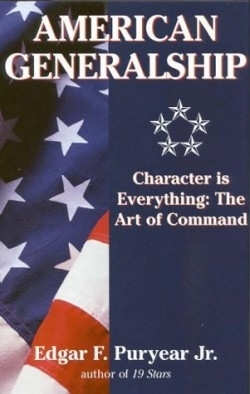American Generalship
Character is Everything The Art of Command
This study of the characteristics of successful leadership in the U.S. military
is the culmination and summation of Puryear’s thirty-five years of research. He
has also produced three other works, Stars in Flight, George S. Brown, and 19
Stars, the latter being a comparative work that focuses solely on who Puryear
considered the four most outstanding generals of World War II: Marshall,
MacArthur, Eisenhower and Patton.
Puryear’s collection of hundreds of interviews with and letters from officers
of high rank, in addition to his extensive research of diaries, autobiographies
and biographies support his eleven chapter dissection of what comprises an
effective and successful leader in the military sphere. Chapter headings
include “Books: The Importance of Reading,” “Aversion to ‘Yes Men’: Having the
Character to Challenge,” and “‘Feel’ or ‘Sixth Sense’ in Decision Making.” Each
chapter is a discussion of a particular characteristic or action that Puryear
feels is vital to a general’s ability to lead soldiers during wartime. He
supports each assertion with evidence from military history, including
anecdotes about the generals he has interviewed.
He also branches out of World War II and into other American conflicts, such as
the Civil War. In chapter ten, he examines the prominent generals involved in
the Civil War: their reputations, their skill in leadership and their rapport
and ability to work with each other.
In the final chapter, “The Pattern,” Puryear examines what he considers to be
the most important of a leader’s qualities: strength of character derived from
amalgamation of all the other qualities. The “pattern” is the qualities that
the generals shared and that “made them great.” They include, in brief: a
desire to serve, accountability, sensitivity to a “hunch” or “sixth sense,”
delegation and effective problem solving.
Puryear’s study is useful for the student of the military psyche and of U.S.
military history, especially those interested in World War II generals. The
book is rich with personal stories that prove these generals to be great
leaders according to Puryear’s litmus test. The anecdotes also humanize men
that are often portrayed as god-like in popular media. Also helpful, Puryear
includes notes at the end of each chapter, citing both important works by and
about the generals he mentions. The notes exhibit his impressive tally of
interviews that spans the last thirty-five years and includes everyone from
Eisenhower to Schwarzkopf.
Reviewed by
Kristin Putchinksi
Disclosure: This article is not an endorsement, but a review. The publisher of this book provided free copies of the book to have their book reviewed by a professional reviewer. No fee was paid by the publisher for this review. Foreword Reviews only recommends books that we love. Foreword Magazine, Inc. is disclosing this in accordance with the Federal Trade Commission’s 16 CFR, Part 255.

